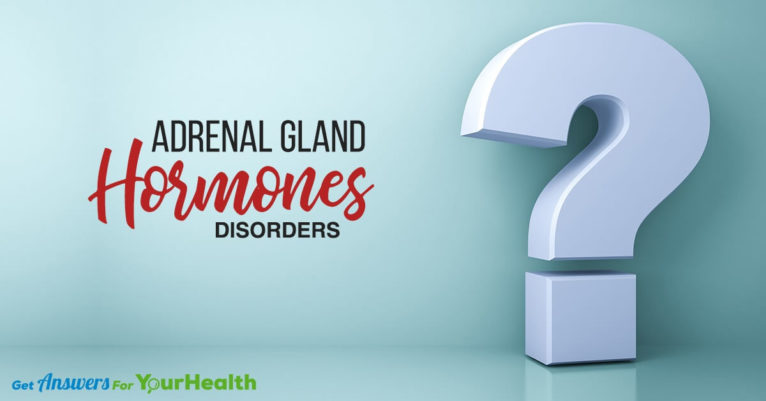1) Grab a FREE copy (Value $14.95) of one of my books Thyroid Symptom Overload
Just pay shipping $7.95 for any US orders. Or, if you want to pay full price plus shipping, order from Amazon :)
2) Take our Thyroid Quiz today and find out what "Thyroid Type" you have
This quiz will help you quickly discover where your symptoms are stemming from.
3) Join Our Thyroid Advocate Membership Site - Natural Thyroid Academy
FREE for a limited time. No credit card required.
4) Work with me and my team privately
Schedule your FREE 15 minute phone consultation and we can find out the best way to help you specifically.
The adrenal glands are part of the endocrine system that are responsible for the production and secretion of various hormones that control many bodily functions. If something happens to the adrenal glands or there is some kind of disruption in the production of hormones, it can lead to many other symptoms felt elsewhere in the body.
Learning about the Adrenal Glands
Situated at the top of the kidneys, the adrenal glands have two major parts, the adrenal cortex and the adrenal medulla. The cortex is made of the outer part of the gland and is responsible for the production of some major hormones like the cortisol and aldosterone. Cortisol helps in regulating metabolism and manages stress, while aldosterone takes care of the blood pressure.
The adrenal medulla is the inner area of the adrenal gland and takes care of the production and secretion of adrenaline, which controls the body’s reaction to stress. The adrenal glands are also known as suprarenal glands.
What causes adrenal gland disorders? Research suggests that adrenal gland hormone imbalances occur due to the overproduction or underproduction of the hormones. This can either be because of some imbalance within the body, or because of some external factor like the use of medications.
There are also times when disorders occur due to genetic mutation whereby people are unable to produce hormones on their own. Tumors, infections, or problems with other glands like the pituitary gland can also lead to adrenal gland hormonal imbalance.
Adrenal Gland Hormonal Disorders
There are dozens of adrenal gland hormonal disorders. Some of the most commonly occurring adrenal gland disorders include:
Cushing’s Syndrome
Cushing’s syndrome is a rare disorder that takes place when the body is producing high quantities of cortisol. The problem can either occur due to some underlying biological issue, but mostly it takes place because of the use of steroid medications.
Some other causes for Cushing’s syndrome include pituitary gland tumor, adrenal gland tumor, or tumors in the pancreas, thyroid gland, or lungs. Here are some signs and symptoms of Cushing’s syndrome:
- Skin conditions like acne, red-blue streaks on underarms and abdominal area
- High blood sugar
- High blood pressure
- Depression, irritability, mood swings
- Fat upper body like round face and neck but thin arms and legs
- Muscle weakness and bone weakness
Congenital Adrenal Hyperplasia (CAH)
Considered to be one of the commonly occurring problems, this genetic condition is one where the person is unable to produce enough quantities of cortisol in the body. These people could also have difficulty in producing adequate amounts of aldosterone yet still secrete excessive androgens. Here are some signs and symptoms of CAH:
- Acne and irregular menstrual cycle
- Excessive facial hair
- Blow blood pressure and sugar level
- Dehydration
- Testicular tumors and infertility among men
- External genitalia might not be normal and may need surgery among girls
Adrenocortical Carcinoma
These are the cancers of the adrenal gland and mostly develop in the outer layer of the gland. The worst part about these cancers is that they are diagnosed very late and spread to other organs rapidly. Here are some signs and symptoms of adrenocortical carcinoma:
- Cushing’s syndrome
- Virilization
- Acne
- Extra body and facial hair
- Weight gain
- High blood pressure
- Headaches
Addison’s Disease
This is a rare condition, where the adrenal glands are unable to produce enough quantities of cortisol and sometimes aldosterone as well. It is an autoimmune condition where the body starts attacking its own healthy cells. If Addison’s disease gets worse, it can come to the point where the glands don’t work at all. Here are some signs and symptoms of Addison’s disease:
- Low blood pressure
- Nausea and vomiting
- Dizziness
- Salt cravings
- Weight loss
- Weakness and extreme tiredness
- Depression and anxiety
Hyperaldosteronism
A disorder that takes place because of excessive excretion of aldosterone, the hormone which controls blood pressure as well as potassium and salt levels of the body. The reason why this hormone gets produced more than what is needed is either because of a tumor or because of hyperplasia, a condition where the glands continue to grow abnormally. Here are some signs and symptoms of hyperaldosteronism:
- Headaches
- Lowered potassium level
- Weakness
- Cramps or spasms in muscles
- Excessive urination
Pheochromocytoma
A kind of tumor, pheochromocytomas are formed in the adrenal medulla, the interior part of the adrenal glands. It leads to high production of adrenaline which can become harmful for the body. Most of these tumors are not cancerous, but 10% of the patients develop cancer in these tumors which can easily spread to rest of the body. Here are some signs and symptoms of pheochromocytoma:
- Elevated heart rate
- Weight loss
- Anxiety, depression or panic attacks
- Tremors and sweating
- Constipation
- Low blood pressure and high blood sugars
- Blurred vision
- Abdominal pain
Diagnosis and Treatment
When it comes to adrenal gland hormonal disorders, accurate diagnosis need to be made in order to resolve the issue. Tests are first conducted based on signs and symptoms of the disease. If you have any of the above mentioned conditions or are fearful that you may have it, you need to get in touch with your medical doctor.
Keep in mind that adrenal gland disorders are manageable and most of them can be managed efficiently. It is important to look not only at your adrenals, but also the rest of your endocrine system as a whole. You may also be a candidate for The DNA Uprint to get to the root cause of the problem.
References
- https://www.nichd.nih.gov/health/topics/adrenalgland/conditioninfo/Pages/types.aspx#suppression
- https://www.nichd.nih.gov/health/topics/adrenalgland/conditioninfo/Pages/symptoms.aspx#pheochromo
- https://www.endocrineweb.com/endocrinology/overview-adrenal-glands
- http://www.hormone.org/diseases-and-conditions/adrenal








